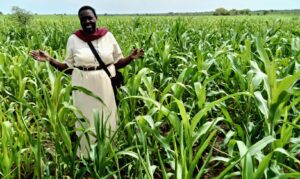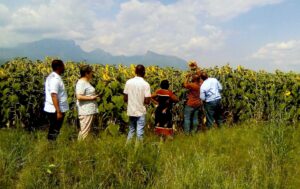IIRR-Uganda launched the Karamoja Greenbelt Women-led Large-scale Farm Project in April 2023 to respond to chronic food insecurity in the Karamoja region and to empower the region’s women to achieve food security, improved nutrition, and economic stability.
The Karamoja sub-region is a semi-arid zone located in the most northeastern part of Uganda, covering around 10% of the country. The sub-region has a population of about 1.4 million and is one of the poorest regions in Uganda, with a multi-dimensional poverty rate of 65.7% (compared to the national average of 20.3%).
Over the years, Karamoja has experienced multiple shocks and stresses, including cycles of water shortages, food insecurity and malnutrition, and environmental degradation. These conditions have resulted in acute food shortages and lost lives and livelihoods. Unemployment levels for women and youth are high, leading to increases in crime, conflict, and insecurity.
 The Karamoja Greenbelt Women-led Large-scale Farm Project will support the Government of Uganda to sustainably address chronic food insecurity in the Karamoja region through the promotion of agro-industry. In particular, the project will promote women-led large-scale commercial farming of staple cereals, oilseed, legumes, poultry, piggery, and other viable livestock enterprises to boost nutrition, production, and income.
The Karamoja Greenbelt Women-led Large-scale Farm Project will support the Government of Uganda to sustainably address chronic food insecurity in the Karamoja region through the promotion of agro-industry. In particular, the project will promote women-led large-scale commercial farming of staple cereals, oilseed, legumes, poultry, piggery, and other viable livestock enterprises to boost nutrition, production, and income.
The project aims to leverage South-South Cooperation to experiment with best practices for large-scale commercial farming as an integrated and self-sustaining strategy for food security, value chain development, women’s economic empowerment, poverty reduction, resilience, and peacebuilding in Karamoja.
As a result of this intervention, nine women-led large-scale commercial farms for staple cereals, oilseed, and legumes will be established in the project’s initial year.
 A pilot of the project launched in April 2023. To date, five women groups, consisting of 30-40 members each, have been identified and enrolled to benefit from the project. A total of 871 acres of land have been cleared; 340 of these acres have been planted. Crops planted include 103 acres of sunflowers, 100 acres of mung beans, 97 acres of sorghum, and 40 acres of maize. The remaining acres will be utilized in the next planting seasons (August 2023 and February 2024).
A pilot of the project launched in April 2023. To date, five women groups, consisting of 30-40 members each, have been identified and enrolled to benefit from the project. A total of 871 acres of land have been cleared; 340 of these acres have been planted. Crops planted include 103 acres of sunflowers, 100 acres of mung beans, 97 acres of sorghum, and 40 acres of maize. The remaining acres will be utilized in the next planting seasons (August 2023 and February 2024).
The project is a joint initiative of the United Nations Development Programme (UNDP), the India, Brazil, South Africa (IBSA) Trilateral South-South Cooperation Forum, and the Ministry of Agriculture, Animal Industry and Fisheries of the Government of Uganda.



